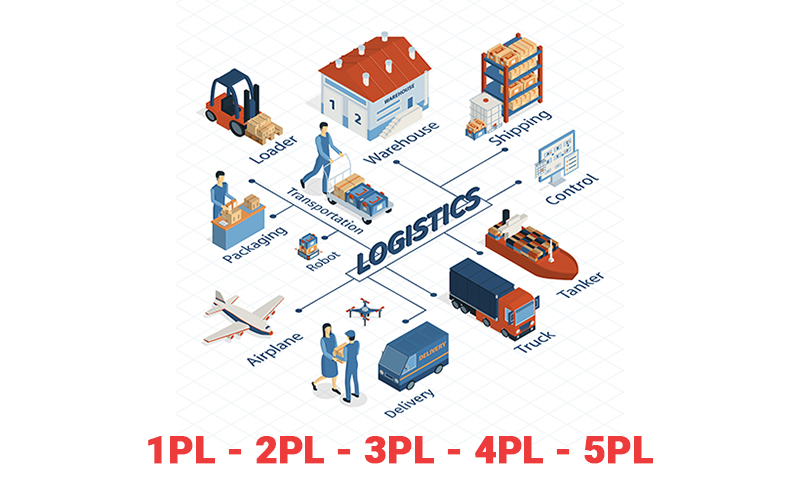Currently, the development of international trade relations requires increasingly professional logistics services. Therefore, we need to have a deep understanding of the nature of 1PL, 2PL, 3PL, 4PL, and 5PL services in logistics to know about the types of logistics services. Specifically, what are 1PL, 2PL, 3PL, 4PL, and 5PL, and how can we distinguish these types of services? To help you have a "simple" view of logistics service models, please read the article below:

Source: Internet
1PL (First-Party Logistics):
It is a manufacturing or goods trading company that manages and operates its own transportation and warehouse processes. The logistics activities of this company are carried out by employees within the company, such as drivers and warehouse staff. These companies usually focus on producing or trading goods and are not specialized in logistics.
2PL (Second-Party Logistics):
2PL is a second-party transportation company that provides transportation services for manufacturing or goods trading companies. 2PL companies usually use their own transportation vehicles or rent from third parties to carry out transportation and warehouse management activities. 2PL companies typically provide basic logistics services such as transportation and storage of goods.
3PL (Third-Party Logistics):
This is a third-party logistics service provider specializing in transportation, storage, and management of goods for customers. 3PL does not own transportation vehicles or warehouses, instead focusing on providing logistics services to other companies. 3PL services include transportation of goods, warehouse management, packaging, and other services.
Examples of some 3PLs: CJ Gemadept Logistics, Transimex Saigon, Sotrans, Damco Vietnam, TBS Logistics, Indo Tran Logistics…
4PL (Fourth-Party Logistics):
This is a comprehensive logistics service provider, managed by a fourth party. 4PL can be considered an intermediary between customers and other logistics service providers such as 3PL. 4PL provides comprehensive logistics solutions to customers, including designing transportation networks, managing logistics processes, and providing optimal solutions to minimize costs and maximize efficiency.
Examples of some 4PLs: Accenture, DHL Supply Chain Solutions, UPS Supply Chain Solutions, XPO Logistics….
This is a newer and less commonly used concept compared to 3PL and 4PL. 5PL is a comprehensive logistics service provider, focusing on providing multi-level logistics solutions to customers. It not only manages traditional logistics processes such as transportation and warehousing, but also provides breakthrough solutions in digital technology, artificial intelligence, blockchain, and other technologies to optimize logistics processes and improve supply chain efficiency.
Some examples of 5PLs are Accenture, Deloitte, IBM, KPMG, PwC, and DHL....
Indeed, the scale and needs of each business will determine the most appropriate logistics service for them. However, making this decision will require consideration of the cost and quality of the supply chain to ensure customer satisfaction.
In the context of the increasingly strong development of e-commerce, 5PL services are predicted to become a popular outsourcing trend in the future. With the development of information technology, 5PL services can help businesses comprehensively manage and optimize the supply chain, from collecting information to analyzing data and providing optimal solutions.